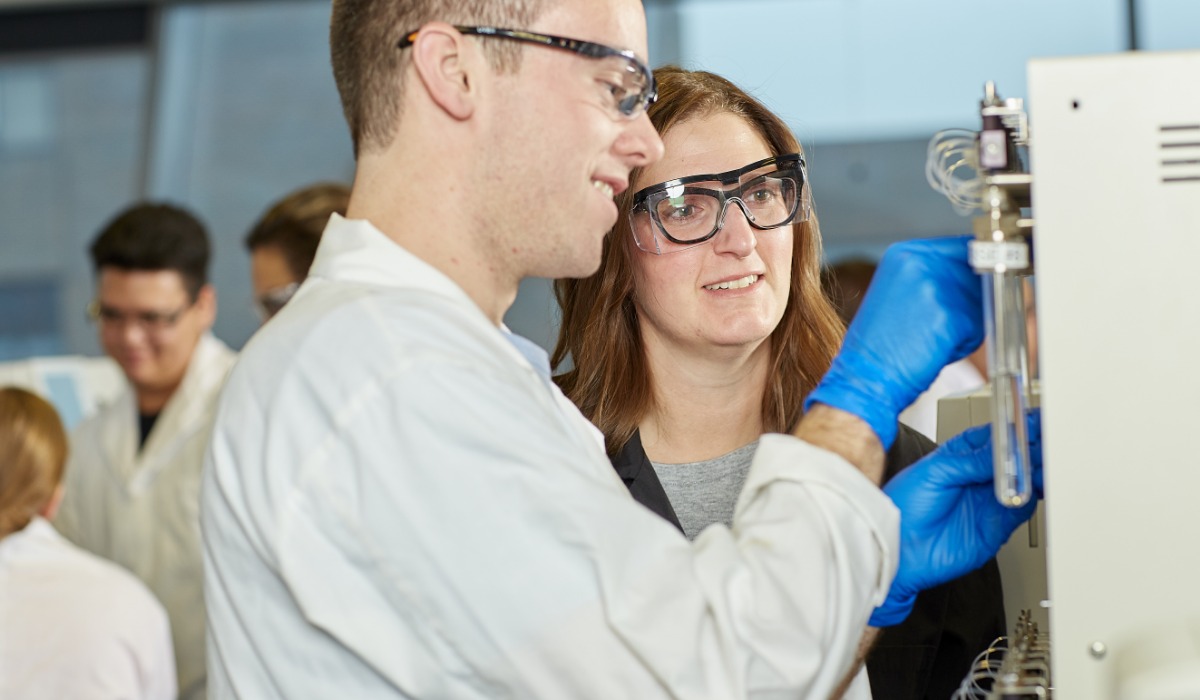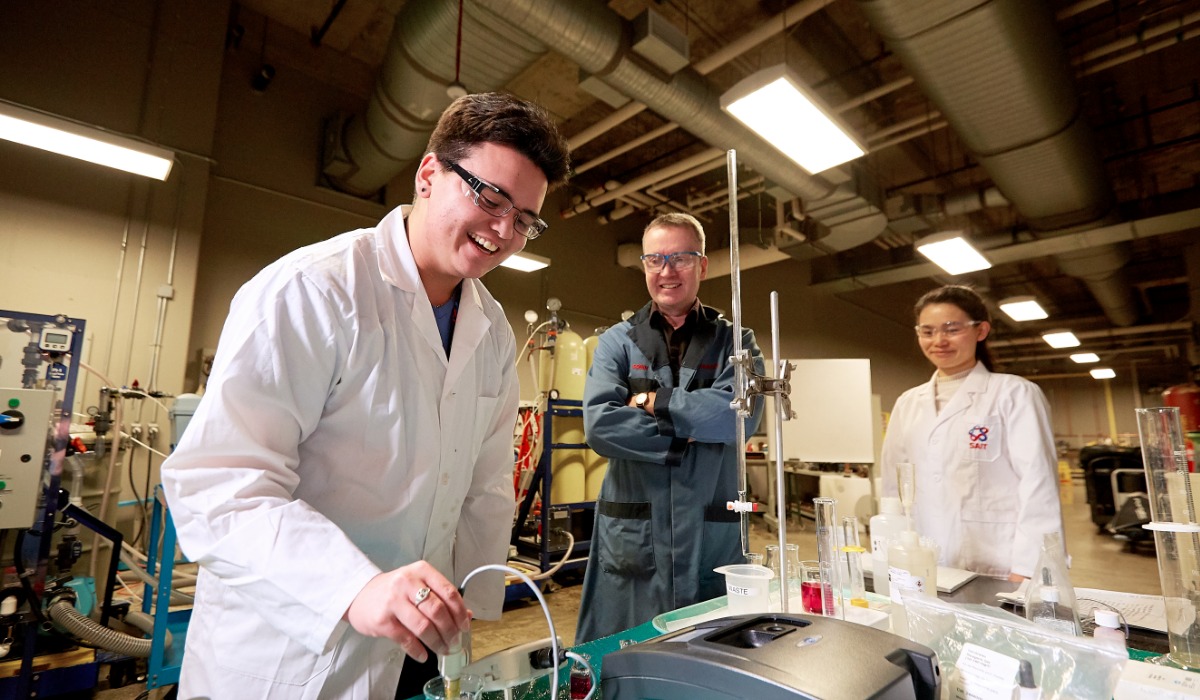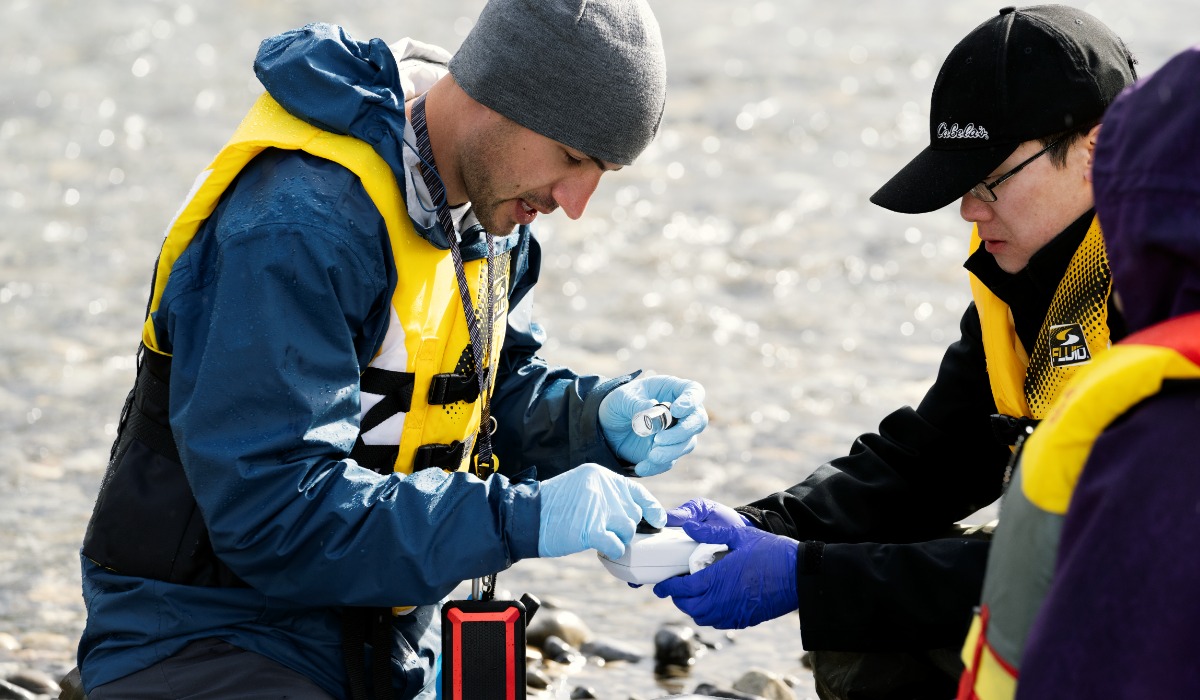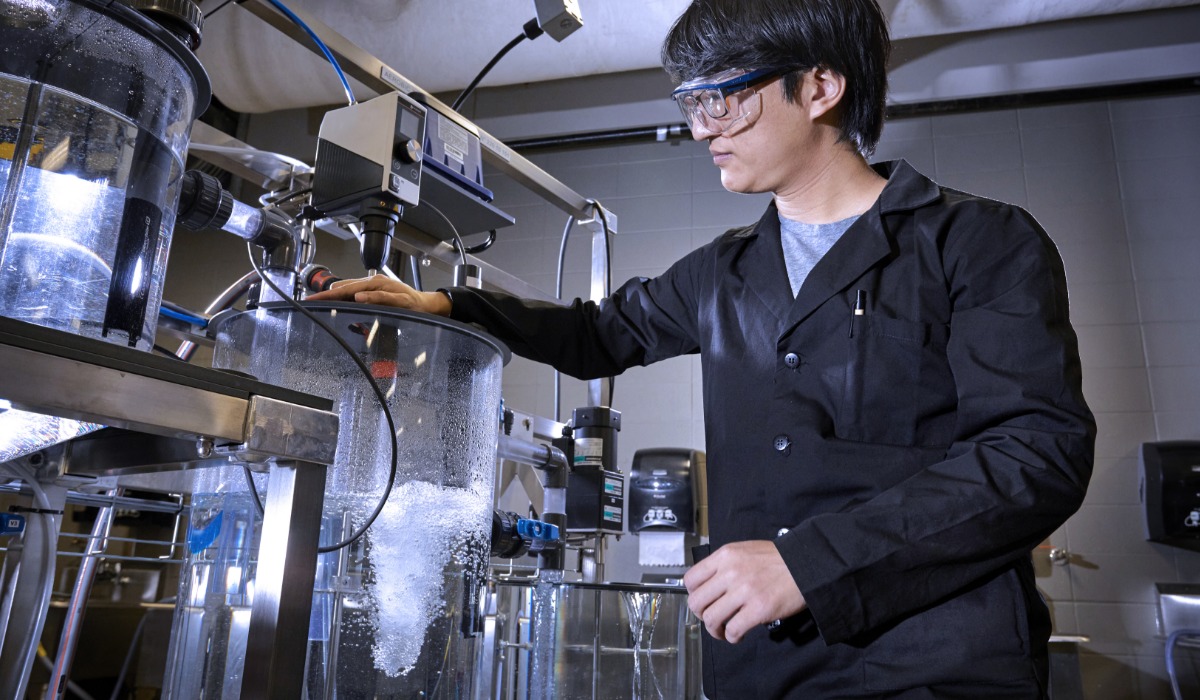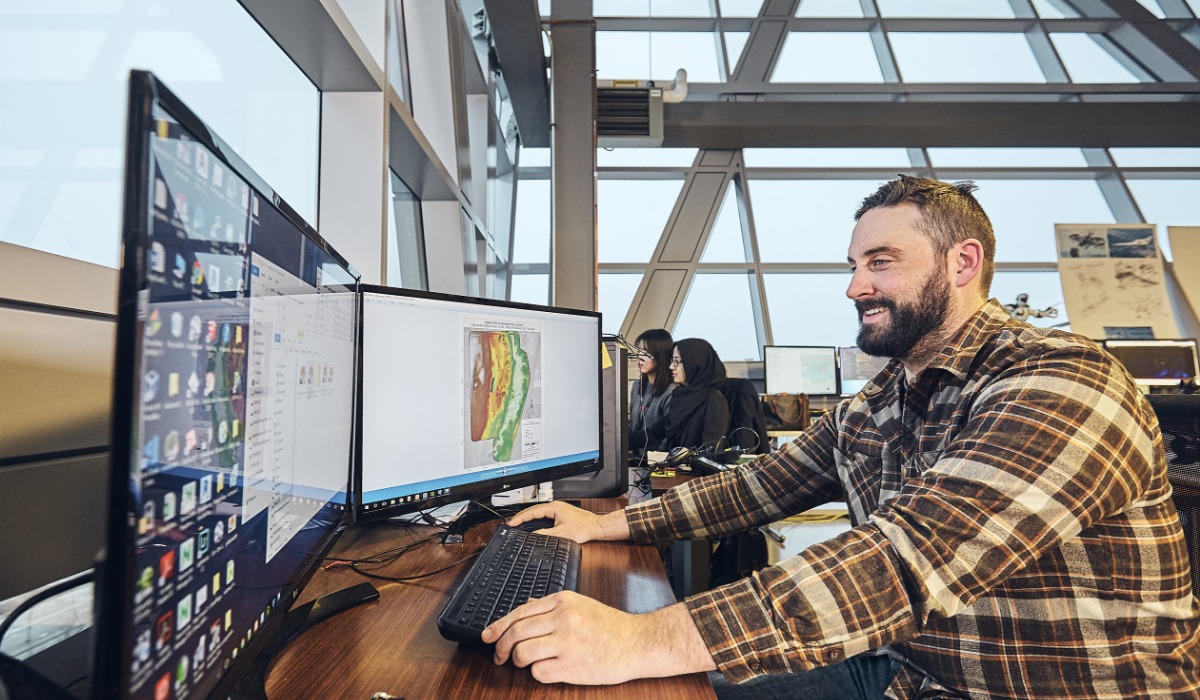Overview
Our Chemical Laboratory Technology program will get a positive reaction from those drawn to the chemical sciences and seeking a role that combines experimentation with practical application.
You will master the fundamentals of chemical laboratory techniques and develop hands-on expertise with sophisticated analytical instrumentation to analyze laboratory samples.
Engage in extensive hands-on laboratory training with the cutting-edge analytical instruments used in modern laboratory practices.
In this program, you will:
- gain comprehensive knowledge of chemical substances and their properties, reactions and safety protocols
- become proficient in the use of advanced analytical techniques and equipment for sample analysis
- develop a versatile skill set applicable to a wide range of scientific settings, from research and development to quality control.
Take advantage of the opportunity to participate in an optional 12-month paid work placement, giving you real-world experience, a taste of your future career and networking opportunities.
This program will prepare you to work as a chemical laboratory technologist or chemical laboratory technician across various sectors, such as industrial corporations, service laboratories, government agencies or educational institutions.
If you are an aspiring laboratory scientist or technician, technologist, or someone interested in research and development in chemical sciences, pharmaceuticals, or chemical technology, this program is for you.
Those who work in laboratory technology tend to be methodical, innovative, and objective.
You need:
- integrity and a professional attitude
- a liking for science (especially human biology) and a keen interest in scientific work
- the ability to do detailed work accurately
- good colour and form perception (to study blood cells, etc.)
- the ability to listen and speak well
- the ability to get along with different people
- the ability to adapt to change quickly and easily.
You should enjoy taking a step-by-step approach to your work, studying results and developing procedures, and using computers and instruments for accurate and precise testing.
You'll have the option to participate in a 12-month work term after your second semester.
During this work term, you'll perform a chemical laboratory technology technical project in an industrial, service, government or university laboratory under the supervision of a lab supervisor.
This work term is not required to graduate from the program.
This program is nationally accredited by Technology Accreditation Canada (TAC).
Graduates can also register with the Alberta Society of Engineering Technologists and Chemical Institute of Canada.
After successfully completing this program, you'll receive a SAIT Chemical Laboratory Technology diploma.
Careers and opportunities
Each year, SAIT conducts a survey between February and April to determine the employment rate, salary and satisfaction of our newest SAIT alumni.
![]() 88% graduate employment rate
88% graduate employment rate
![]() $49,920 average starting salary
$49,920 average starting salary
Find out more about our graduate employment statistics >
Our graduates may work in the following occupations. Some careers require additional experience and education.
Associated National Occupational Classification (NOC) codes: 22100, 92011, 93101.
Career planning support
Unsure which career path is for you? Here are some recommended career planning resources to help you decide your future.
You can also head to Alberta alis for lots of information about careers in Alberta, including quizzes and labour market information to help you narrow down a path.
Finally, you can take our online career finder quiz, which can help narrow your options based on your current skills and interests.
Courses
The Chemical Laboratory Technology diploma requires 61.5 credits (21 courses) to complete.
The program spans two years, with two semesters each year. If you choose to complete the optional one-year co-op work term, the program spans three years.
| Course | Credits |
|---|---|
|
This course provides the basic concepts of chemistry. Topics include: measurements and calculations, matter and energy, composition and reaction stoichiometry, aqueous solutions, gases, thermochemistry, titration reactions and calculations, and the use of orbitals to depict the three dimensional aspects of organic chemistry. |
3 |
|
CHEM 245 introduces kinetics and thermodynamics for ideal systems, and applies them to problems relevant to the technologist. Topics include kinetics, calorimetry, phase equilibria for one-component systems, partition and chemical equilibria, the first and second laws, Ksp and Kf calculations and galvanic and electrolytic circuits. Pre-requisites:
|
3 |
|
Organic Chemistry provides an overview of the principles of organic chemistry. The student will examine the structure, bonding and naming, as well as the physical and chemical properties of each of the organic functional groups. The focus of the course will be placed on studying the important organic molecules that are involved in biological processes, as well as molecules of industrial importance. The specific industrial processes examined will include: Food and beverages, petroleum recovery and processing, the mining industry, petrochemicals, polymers and pulp and paper. Pre-requisites:
|
6 |
|
You will learn basic laboratory techniques and safety practices that you will be able to apply to the rest of your program and in your future career. Topics include: laboratory safety, emergency response procedures, the safe disposal of chemicals, identifying, selecting, and maintaining laboratory equipment and glassware, reading measuring devices and instruments, weighing, using volumetric glassware for the preparation of solutions and titrations, measuring physical and chemical properties such as melting point, boiling point, density, relative density including API gravity, pH, electrical conductivity, percentage transmittance, and refractive index, filtration, simple and fractional distillation, solvent extraction, crystallization, and thin layer and open column chromatography. |
6 |
|
Analytical Chemistry involves quantitative analysis by two classical methods of analysis: gravimetric and volumetric. Preparation and standardization of required reagents are also an important part of these chemical analysis. The basic techniques developed in Semester 1 are essential to performing the required analysis. Pre-requisites:
|
1.5 |
|
An introduction to the treatment and handling of chemical data. Data analysis and calculations, including advanced logic statements, linear regression, and derivatives, will be used to interpret analytical data and create professional reports. PivotTables will be created to organize, summarize, and report large amounts of worksheet data. Pre-requisites:
|
1.5 |
|
A laboratory technical project performed in an industrial, service, government or university laboratory. The projects are selected by the various outside laboratories and are supervised by personnel from industry, government or university. An instructor acts as liaison between student and industry supervisor. This course takes place during the winter semester of the last year of the program. Pre-requisites:
Corequsites:
|
1.5 |
|
An overview of unit operations as practiced by Chemical Engineers and Chemical Engineering Technologists that would be applicable to chemical technologists. It includes some basic concepts in fluid flow, heat transfer and mass transfer operations and their application in chemical and petroleum industry. The student learns to read flow sheets and recognize major process equipment such as pumps, heat exchanges, compressors and distillation towers. |
1.5 |
|
You will be provided with an overview of common oil field chemicals and fluids, their properties and functions. Topics include rock types and reservoirs, drilling and completion fluids, acidizing and fracturing fluids and cementing. You will obtain practical experience in testing various fluids. An appreciation for safety and the environmental impact of petroleum production will also be discussed. Pre-requisites:
|
1.5 |
|
This course is designed to develop technical writing and presentation skills to ensure workplace readiness. Students will learn how to evaluate communication situations, analyze documents, assess research sources and develop organizational skills to apply in their work. They will learn about and practice designing, formatting and writing a range of professional documents. Students will also develop confidence (through practice) in the development and delivery of effective and engaging presentations. Equivalents:
|
3 |
|
This applied computer course provides students with critical electronic communications, data and file management skills, along with a strong focus on using common productivity applications to format, calculate, analyze, visualize, and present or report data and information. Equivalents:
|
1.5 |
|
An introduction to water treatment that includes water quality considerations, chemical and physical parameters, natural sources, oil patch, petrochemical, municipal, domestic uses and swimming pools. Scale deposition is mathematically predicted and cost effective control measures are considered. Water treatment processes of subsidence, coagulation, filtration, aeration, dearation, chlorination, water softening, reverse osmosis, boiler scale control and cooling water treatment are studied. Results are calculated, reports issued and recommendations are given by students. Bench scale jar testing, Imhoff cone testing, chlorine demand studies. OLI Software for the computer modelling of water chemistry will be introduced. Results are calculated, reports issued and scale up recommendations are made. Pre-requisites:
|
1.5 |
|
The Environmental Science/Ecology course will provide you with a general overview of environmental science. It includes discussion on pollution resulting from natural and man-made sources with an emphasis on the chemical analysis of specific contributing compounds. The relationship between ecology and the environment to contamination, pollution, and other current environmental concerns is covered. Selected laboratory analyses offer you the opportunity to examine surface water, industrial wastewater, ambient air, and soil samples. Pre-requisites:
|
3 |
|
The Chemical Instrumentation course will provide you with the necessary foundation required for more advanced instrumentation courses. You will explore the theory behind electrochemical, spectrophotometric and chromatographic techniques and examine the design and operation of the required instrumentation. Topics include: conductivity, pH, electromagnetic radiation and its interaction with matter, absorption and emission spectrophotometry, gas and liquid chromatography, mass spectrometry and radiochemistry. Pre-requisites:
Corequsites:
|
1.5 |
|
The Chemical Instrumentation Laboratory course will provide you with the necessary foundation required for more advanced instrumentation courses. You will gain hands-on experience with visible UV and IR spectrophotometry, fluorometry, ICP-AES, AA spectrophotometry, GC, IC, HPLC, GC/MSD and X-Ray fluorescence. Pre-requisites:
Corequsites:
|
3 |
|
You will examine the theory, applications, and limitations of a series of analytical techniques. The course provides the knowledge and practical experience to evaluate and recommend analytical techniques. Quality control in the laboratory is practiced. Experience in using computer software operated chemical instruments for sample analysis is also provided. Pre-requisites:
|
6 |
|
Applied Analytical Instrumentation II will equip you with the knowledge and practical experience to evaluate and recommend analytical techniques. Emphasis will be placed on designing an analytical experiment, sample preparation, and troubleshooting of instrumentation. You will examine the theory, applications, and limitations of a series of analytical techniques. Pre-requisites:
|
6 |
|
Mathematics for Technologists will provide learners with concepts in algebra, trigonometry, arithmetic of complex numbers, linear algebra, exponential and logarithmic functions, rates of change and statistics. This course provides foundational mathematics skills for engineering technologists. It covers a variety of mathematical models for solving application problems. |
3 |
|
You will gain a strong understanding of the quality assurance and quality control protocols currently practiced in today's laboratories. The QA/QC course offers you the opportunity to participate in an industrial round robin program. Topics covered include sampling, statistical analysis, method development, charting, documentation, audits and accreditation, QA planning, and corrective actions. Pre-requisites:
|
3 |
|
In this course, students will learn about the many potential hazards encountered when working with chemicals. Course topics include proper handling and storage practices, incident prevention measures, and the care and use of personal protective equipment. The course also addresses the related Occupational Health and Safety (OHS) legislation, emphasizing the Working with Hazardous Materials Information System (WHMIS) and waste disposal. Students will learn about the toxic nature of various chemicals and their environmental effects, effective emergency response strategies and the legal consequences of failure to comply with legislation. Equivalents:
|
1.5 |
|
THRM 318 consists of both Theory and Lab components. The Theory portion includes a study of bonding, equilibria and kinetics for ideal and real systems. Topics covered include heterogeneous redox reactions as they apply both to corrosion control and to various analytical techniques; equilibrium calculations with acids, bases and buffers; phase equilibria of ideal and real two component systems, and a macroscopic study of liquids, crystals, surfaces, and colloidal suspensions; The course ends with a kinetic and thermodynamic study of nuclear chemistry. The lab portion of the course covers corrosion control and monitoring, and electro-analytical techniques. Pre-requisites:
|
3 |
| Course | Credits |
|---|---|
|
Students will gain practical experience through a temporary work placement with a member of industry. The work placement includes full-time paid employment. Pre-requisites:Manual Prerequisite One of:
Equivalents:
|
0 |
Progression
You must attain a PGPA and/or a CGPA of 2.0 or better each semester and pass the prerequisite courses to progress through the program.
To qualify for graduation, you must pass all courses, attain a CGPA of 2.0 or better and complete course requirements within the prescribed timelines.
Review our grading and progression procedure >
Explore your options!
Some courses in this program are available through Open Studies. You can complete courses via Open Studies to get a head start on your education, reduce your course load once accepted into a credentialed program, or determine which career path best suits you before you fully commit.
You may also take courses for general interest or personal and professional development.
Admission requirements
Applicants educated in Canada
All applicants must demonstrate English language proficiency and meet all of the following requirements or equivalents:
- at least 60% in Math 30-1 or 75% in Math 30-2, and
- at least 60% in English Language Arts 30-1 or 75% in English Language Arts 30-2, and
- at least 60% in Chemistry 30.
SAIT accepts high school course equivalents for admission for applicants educated outside Alberta.
All applicants who were educated outside of Canada must demonstrate English language proficiency and provide proof they meet the program admission requirements outlined above with an international document assessment. Find accepted educational documents and assessment options.
SAIT may also accept courses completed at certain international post-secondary institutions.
Academic Upgrading
Missing an admission requirement for this program? Upgrade your prior education to help you receive admission into one of SAIT's career programs.
English language proficiency
All applicants must demonstrate English language proficiency prior to admission, including students educated in Canada.
Transfer agreements
At SAIT, we have created transfer agreements with partner institutions to allow you to earn course credits toward your SAIT program based on your previously completed credentials.
Transfer Alberta search tool
Use the Transfer Alberta search tool to see all transfer agreements between Alberta post-secondary institutions (including those with the University of Calgary, Mount Royal University and Bow Valley College.)
Search transfer agreements in Alberta
Transfer options for graduates
When you have completed this program, you may continue your education at a partner post-secondary institution. These transfer agreements include partnerships within and/or outside of Canada.
Credits this program transfers to
- Available credits:
- 57
Upon successful completion of this program, you can ladder into the third year of TRU's Open Learning Bachelor of Technology program, provided you meet the admission requirements.
- Available credits:
- 60
Upon successful completion of this program, you can ladder into the third year of TRU's Open Learning Bachelor of Technology: Trades and Technology Leadership program, provided you meet the admission requirements.
- Available credits:
- 60
Earn your degree with an additional two years of study. Graduates of this program can receive 60 credits towards their Bachelor of Science in Environmental Science degree, plus one additional university-level biology course (Cellular Biology or Biochemistry is recommended) at Royal Roads University.
- Available credits:
- 60
Earn your degree with an additional two years of study. Graduates of this program can receive 60 credits towards their Bachelor of Science in Environmental Practice degree at Royal Roads University.
- Available credits:
- 60
Earn your degree with an additional two years of study. Graduates of this program can receive 60 credits towards their Bachelor of Arts in Environmental Practice degree at Royal Roads University.
Available intakes
Fall 2026
Start dates:
- Domestic students: Open
-
-
Application deadline: June 30, 2026
-
- International students: Open
-
-
Application deadline: May 29, 2026
-
Costs
2025/26 tuition and fees
The following estimated costs are effective as of July 1, 2025.
The estimated total cost of tuition and fees is based on the suggested schedule of study. Following a modified schedule will impact the fees you pay per semester and may alter final costs.
Domestic students
The program total is based on the estimated amount you will pay if you enter this program during the 2025/26 academic year. The program total amount listed on your letter of admission may appear higher. This amount is your maximum tuition guarantee for the program. SAIT will not exceed this maximum, regardless of changes in tuition and fees between academic years.
Books and supplies are approximately $1,000 for the first year and $500 for the second year.
This is a bring-your-own-device program with a standard computer hardware and software requirement. See the specific requirements on our computers and laptops page.
Find your booklist on the SAIT Bookstore's website. The booklist will be available closer to the program start date. Can't find your program or course? The bookstore didn't receive a textbook list. Contact your program directly to determine if they're still refining course details or if you're in luck; no textbook purchase is required this term.
Required personal protective equipment (PPE)
The industry-approved PPE you'll need will be discussed during your first few days of classes.
PPE is required in various labs. You'll need a lab coat and CSA-approved safety glasses (with UVEX and side shields) by the first day of class to enter the chemistry labs.
Financial aid
Paying for your education may feel overwhelming, but we have resources and programs that can help, including information about payment options, student loans, grants and scholarships.
Application process
Ready to apply?
Follow our step-by-step guide to submitting a successful application.
Communication during admission
Email is the primary source of communication during the selection process. Ensure your personal email account is managed appropriately to receive our emails, files and communications. We recommend you add the macphail.students@sait.ca domain to your safe senders' list or you risk missing critical email messages.
Begin your application
Apply now using the online application portal.
Ensure you have a valid Visa or Mastercard to pay the non-refundable application fee of $120 for domestic applicants or $175 for international applicants.
Information sessions
Prepare for a strong start in your chosen program or get the details you need to decide your future path.
Our expert staff and faculty are ready to answer your questions and provide information about the following:
- What sets SAIT apart
- An introduction to the program and area of study
- Admission requirements
- Future career paths
- Information on the earning potential and graduate employment rates.
Contact us
MacPhail School of Energy
-
Phone - 403.284.8451
International Student Advising
-
Phone - 403.284.8852
-
Email - international@sait.ca
Subscribe for updates
Your journey starts here! Sign up to get important updates on:
- Energy and environment programs
- Application information
- Relevant news and events

Oki, Âba wathtech, Danit'ada, Tawnshi, Hello.
SAIT is located on the traditional territories of the Niitsitapi (Blackfoot) and the people of Treaty 7 which includes the Siksika, the Piikani, the Kainai, the Tsuut’ina and the Îyârhe Nakoda of Bearspaw, Chiniki and Goodstoney.
We are situated in an area the Blackfoot tribes traditionally called Moh’kinsstis, where the Bow River meets the Elbow River. We now call it the city of Calgary, which is also home to the Métis Nation of Alberta.
